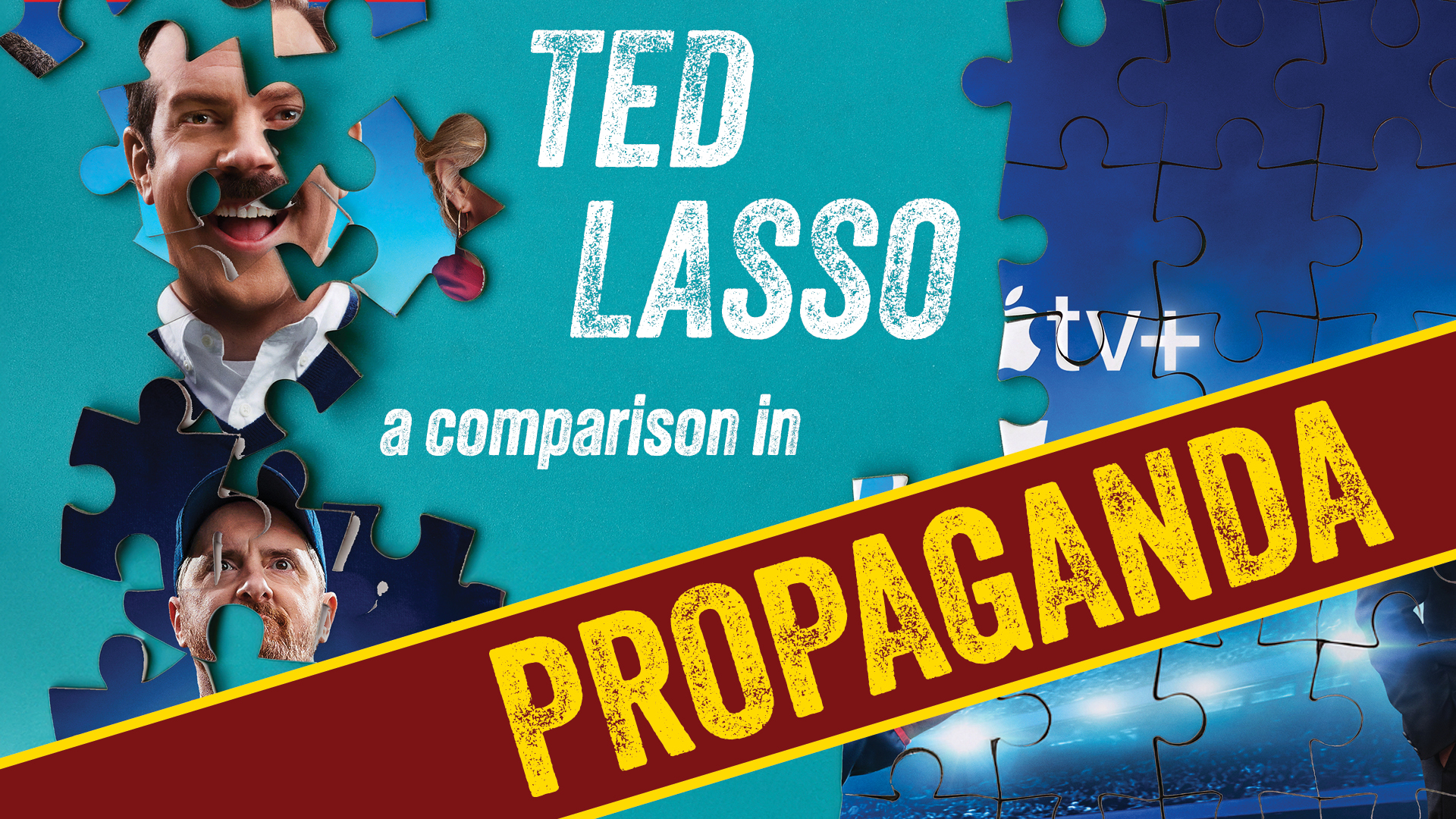The flooding of information in today’s media age makes it extremely difficult to tell fact from fallacy. There is an overabundance of messages out there with unseen characters spreading information to suit their needs. So many messages and so many actors. In the world of politics and war, I see these messages as propaganda. The problem is, it’s quite difficult to know how and when propaganda is happening. But what if I told you that Ted Lasso could be used as a template or guide to understand propaganda messaging?
Let me explain.
Ted Lasso is the perfect introduction to football for Americans (a.k.a. soccer) who aren’t familiar with the rules. Any U.S. company looking to grow market share in football knows that building a love for the game is the best way to gain followers. Enter Ted Lasso, a heartwarming show hosted on Apple TV+ — also the home of Major League Soccer’s (MLS) subscription service — about an American football (the other, other football) coach in England, leading a Premier League football club, AFC Richmond.
The show has all the right pieces to gain a huge following, which it has done. Hitting on a range of noble ideas such as teamwork, humble leadership, and building a unified team, it gives Americans a way to learn about the world’s most popular sport. While viewers follow the ups and downs of AFC Richmond and its loveable characters, they gain a greater understanding of the positive aspects of the game but there is a purposeful deflection of its negative sides. Some ignored issues include hooliganism, racism, and homophobia (Cleland, 2014, 2018; Cleland & Cashmore, 2016, Football Hooliganism – All You Need to Know, n.d.). This isn’t an accident, and that is what I’m here to discuss.
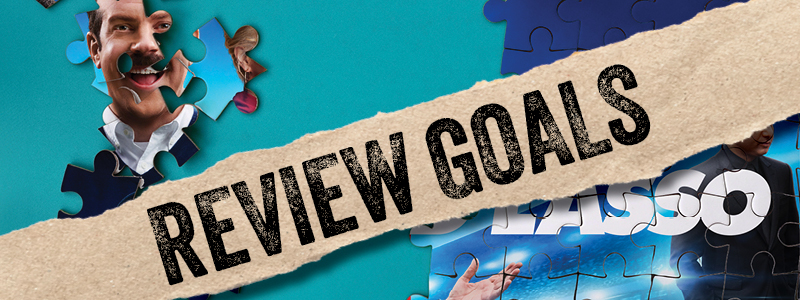
- This review is about seeing similarities in the show’s writing, how Apple promotes football while ignoring its problems, and how those strategies can be compared to propaganda.
- This is an exercise in comparison and understanding, a critique and review of a television series with stakes in the football game in the U.S.
- I will use Ted Lasso to shape understanding of propaganda from a non-war/non-political perspective. Our cognitive bias notwithstanding, when we bring politics and war into the equation, the waters get muddied and I’m hoping to remove those barriers by using a TV show.
- By the end of this review the hope is that readers will have a better understanding of what propaganda is, thereby empowering them to identify the strategy in political situations.
A Note: I use Apple TV+ and Apple interchangeably but I see them as the same company, Apple. Also, I am not disparaging Apple in any way, just critiquing and reviewing a television show, and using it to help draw comparisons of propaganda. The opinions are my own and are couched in communication theories. Also, I really love the show.

Using television to sell a new product is nothing new; this marketing has been implemented with He-Man and the Masters of the Universe. The show was created to give kids a reason to buy toys. He-Man wasn’t the only one to do this. G.I. Joe is another product-sold-through-TV, and so were many others.
Ted Lasso just happens to have an extremely large investment by Apple TV+. Paying out a $2.5 billion 10-year investment for exclusive broadcast rights to stream MLS games, thus creating a television show to ingratiate Americans to the sport has benefits for the company. Forbes magazine suggests this is a winning move, “It’s the one and only traditional sports league that attracts the same demographics as streamers, including Gen Z males,” (Ikram, 2023). Apple TV+ has put in the time, and copious amounts of cash, to see its subscription service bring profits.
This is where the propaganda comparison comes in: Apple TV+ wants to capitalize on its large investment and creating a show that celebrates the beautiful game (Arantes do Nascimento, 2022), and draws people to its streaming service, is a win for the company. To do that effectively, some of the issues that come with the sport will have to be ignored or downplayed otherwise Apple could lose potential subscribers. The company is looking at it from a numbers game knowing that a certain percentage of Ted Lasso viewers will have gained enough interest to stream football games. If Apple sets a goal to see 10 per cent of Ted Lasso viewers streaming football games, then the more viewers the better.
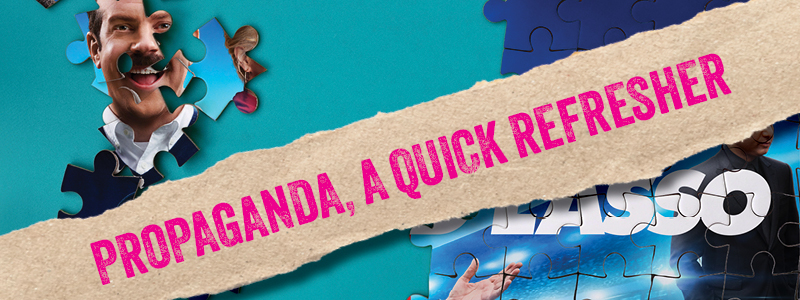
We’re familiar with propaganda being used as a strategy to manipulate the masses in wartime, specifically in the two world wars (Walton, p. 385, 1997). However, propaganda is used to support an end goal, to make one’s side look better than another’s while also downplaying issues on your own side (Walton, p. 284, 1997). Ted Lasso isn’t really propaganda in terms of making one’s argument look better than another’s, but it makes an ideal comparison of strategies to understand the theory and its application.
If you haven’t yet, check out my piece comparing post-truth and propaganda as part of my Master’s studies. Listen to the podcast here In it, I guide listeners through a journey of understanding the strategies comparing tactics 100 years apart.
For now, the basic idea of propaganda is this: a propagandist’s message and their intention are two different things. Warren Taylor explains it rather well, “The propagandist is a good showman. His method, but not his motive, is to entertain,” (pp. 557-558, 1942). In this case, Apple is the showman.
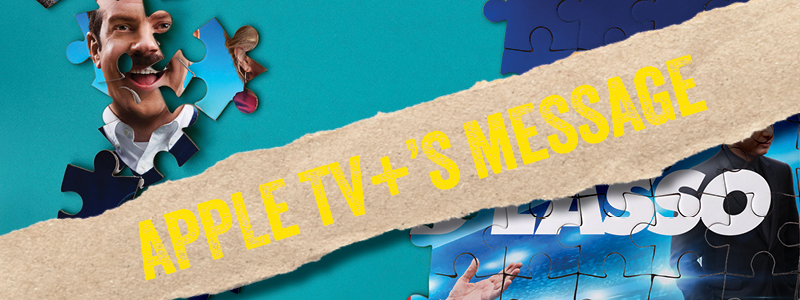

“Football is life!”
As previously stated, Apple TV+ wants people to buy into its streaming service and if a television show evokes positive feelings about the sport, enough to gain subscribers, then it doesn’t necessarily matter how that gets done, including ignoring negative elements of the sport.
Thus, “Football is life!”
Despite overwhelmingly positive reviews, there was one critical opinion piece that piqued my interest. The New Statesman featured a piece by writer Sara Manavis (2021) challenging, well, pretty much everything in the series. This is the closest thing to any type of criticism and I was curious to see if it hit on any of the issues football faces. Manavis has some good points about plot and character development but in the long run her points don’t matter. The show is increasing its subscriber base and the more people who sign up the better. Her criticism is more likely helping viewership for Apple TV+ than making any real critical discussion about Apple. Sometimes bad news is good for business. A good example of this can be seen in the political sphere. Former president, Donald Trump, whom I argue is an effective and skilled propagandist was able to manipulate news media during the 2016 presidential race to earn massive awareness of his messages through his braggadocious rhetoric and outrageous statements. The strategy garnered negative media feedback from most news outlets and millions of views. According to a New York Times article, he spent less than most 2016 candidates but earned close to $2 billion worth of media mentions (Confessore & Yourish, 2016) and the presidency.
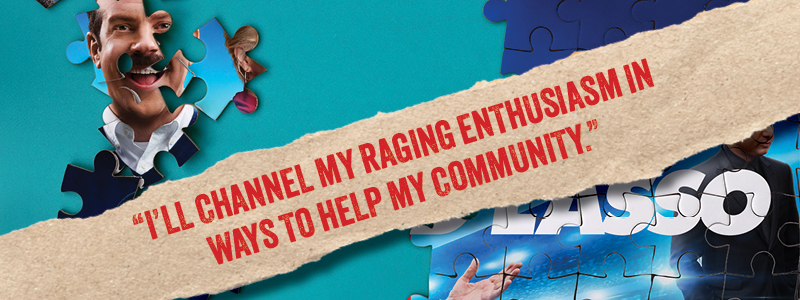
Ted Lasso is full of positive messages, skipping past some of the more nefarious sides of football. For example, in season two, episode six, The Signal, one football fan in a pub suggests he’d break a chair if AFC Richmond makes a goal. The owner gives him a severe look and he eventually says, “I’ll channel my raging enthusiasm in ways to help my community.” This is positive and brings good vibes all around but it’s not really what happens with football. It’s the closest example to Hooliganism that I could find in the show, and the gangs that come from the game (Football Hooliganism – All You Need to Know, n.d.). There is one other incident in the show that suggests there may be some type of hooligans around. In season two episode nine, Beard After Hours, there is a moment when a character, Coach Beard, is faced with drunken fans after a game and he nearly gets the heck beaten out of him, although the scene is more of an extension of the story line between Beard and one player’s abusive father, one of the drunk men who attacked Beard. For Apple, talking about hooligans is not ideal, which might take away from its goal of developing fans of the game. Apple’s job is to entertain and to see long term subscription growth. Getting into the weeds of football hooligans is counterproductive to its aims. As Taylor (Pp. 557-558, 1942) suggests, “The propagandist is a good showman. His method, but not his motive, is to entertain.” We have to remember, despite negative connotations around propaganda (Walton, 1997), the strategy continues to be used to this day.
There are other issues associated with football; racism, sexism, and homophobia (Cleland, 2014, 2018; Cleland & Cashmore, 2016). Within the context of racism, Ted Lasso tackles the issue through positive messaging. In season three, episode seven, The Strings that Bind Us, one of the main characters, Sam Obisanya is a Nigerian footballer on AFC Richmond, who also owns a restaurant. He challenges a political leader who is against helping refugees trying to get into the country. He calls her out on Twitter which results in his establishment being broken into and graffitied with the words, “Shut up and dribble”.
A side note: The graffiti is the verbatim statement that Fox journalist, Laura Ingraham, delivered to LeBron James’s on Twitter in response to his opinion of former President Donald Trump (Sullivan, 2018).
Obisanya now has a problem but his father and teammates come to his aid without question. This is a good message as it challenges the status quo and encourages viewers to think critically about the issue. What it isn’t pointing out, is the level of racism non-Caucasian players face on and off the pitch. Indeed, Cleland’s 2013 article addressing the racism surrounding football discussions online states, “the prominence of racist discourse on fan message boards suggests that this is unlikely to change for the foreseeable future.” Warren Tayler’s (P. 560, 1942) critical assessment of propaganda adds that one of the strategies of propaganda is to evade the issue at hand or generalize and compromise on something. Adding to this idea is the question of ethics related to withholding certain important pieces of a problem (Walton, p. 385, 1997).
“The implication is that this type of discourse masquerades as something else, that is not what it appears to be on the surface, and hence that some kind of duplicity or pretense is involved in it.”
Apple is purposely avoiding the scope of the problem as it is too complex and troubling to delve into. It’s more lucrative for the company to write about team spirit and a happy conclusion because the reality is darker, which is bad for business.
Ted Lasso also takes on homophobia in season three, episode nine in La Locker Room Aux Folles. Written in the show’s comedic way that includes humour, conflict, and a fruitful conclusion with positive reinforcement, the show touches on the problem but deflects from bigger problems around homophobia in football. According to Cleland (2018), there are very few footballers who are openly gay. Some of that can be attributed to a loud minority of anti-gay football fans, and some of it due to football organizations themselves. Cleland suggests football clubs could facilitate more discussions around homosexuality (2018) to create an inclusive environment. The La Locker Room Aux Folles episode is a bit more in line with what researchers are finding, that there is more openness and willingness to talk about sexual identities, but Cleland feels there is still work to be done. He points out that in 2010 a Swedish TV channel took down an online article about Anton Hysén coming out as gay due to overwhelmingly hateful comments. So, Apple does tackle a potentially controversial issue, but it’s also ignoring antagonism that LGBTQ+ players likely fear from fans. Perhaps, as Walton suggests, the goal is to appeal to the masses with a focus on common sense (P. 386, 1997), which rings true for the writing. Any time there is an issue, there’s a “common sense” solution to the problem that is of a noble nature. Now, Walton was speaking from a political and policy point of view, but I argue the above episode uses the same tactics, influencing viewers to a commonsense resolution. There is a moment in the episode when one of the characters, Colin Hughes (Billy Harris) comes out as gay to his AFC Richmond team and the response was overwhelmingly positive. Walton says critics see this type of propaganda as hopelessly optimistic and a distortion of reality. While Walton (1997) speaks about hopelessly optimistic ideals, media framing makes it much easier to guide viewers toward a different perspective than the reality may reflect.
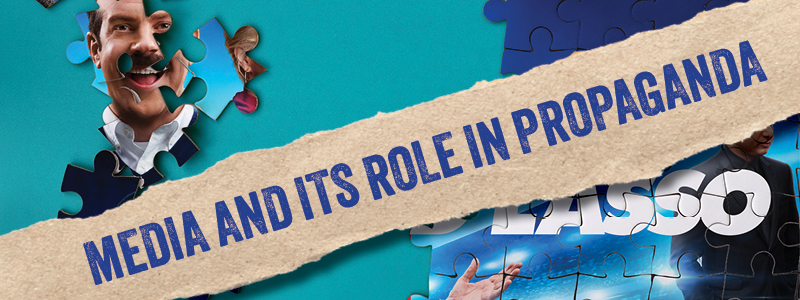
Apple owns the most important piece to a successful propaganda campaign, media. In American and European propaganda, media was and is still considered paramount in creating behavioural change across a large population. During the First World War, George Creel’s Committee on Public Information used mainstream media to incredible levels, reaching every single household in America. Tactics in the First World War were then fine-tuned in the Second World War. Confirming this idea is Edward S. Herman and Noam Chomsky, who wrote a book called Manufacturing consent: the political economy of the mass media (2002) (get it here). They propose an idea called the “propaganda model”, in which the media is a witting and unwitting partner influencing the public to support a government’s political agenda. Ted Lasso isn’t political, but Apple is using its media to promote football while ignoring the negative aspects of the sport, a strategy that any propagandist would use to support its goals. Apple TV+ in this case is its own media. Ted Lasso is also putting forth a different way of thinking and Apple is using its media power to shape the conversation and influence its viewers. That isn’t necessarily a bad thing, but Apple is picking and choosing which issues to shed light on, much like a propagandist would do to promote their end goal.
There’s another moment when the show creates an almost spiritual feeling around football to introduce the subject of a European “super league”. Critics suggest a super league would create exclusive games between the bigger football clubs, which would cost more for fans while increasing profit for clubs, something fans are against. In Lasso’s season three, episode 10, International Break, there is a moment where the fictional owner of AFC Richmond, Rebecca Welton (Hannah Waddingham), takes on other elite football club owners who are planning for a super league. She makes an impassioned speech, accompanied by some truly inspirational music and background video, and forces the owners to realize that football is a game that hits the hearts of fans. She questions their need for more money, asking if they have enough and shames their greed. Inspired by her comments, the owners agree to turn down the plan. But the super league could become a reality despite pushback from fans (Rachini, 2023). The future of a super league remains unclear, but the reason club owners are interested in pursuing the idea is because of profits. Clearly for a business, it doesn’t really matter how much money is made, the more the better. So, the story says one thing, but the truth is different. A super league is still possible and fans will likely fork out the extra money to watch these elite clubs, because after all, “Football is life!” Apple’s take on this is to celebrate the beautiful game and play to the viewer’s emotions while ignoring the reality, something Taylor (1942) and Walton (1997) suggest is a key part of a propagandist’s strategy. If Apple can charge more for its product to increase profits, it will, and so will football clubs.
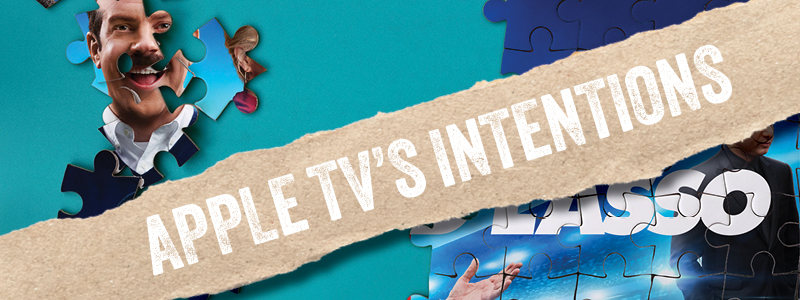
If you really want to understand the motivation of an organization, follow the money.
Recognize that companies are generally motivated by profits. It’s the nature of their existence, and something Apple is very proficient at, I would add. It is what it is.
Apple has put in big investments to support its MLS streaming service. It is reported to have paid half a million pounds for broadcast rights to Premier League’s archive footage and of course there is the $2.5 billion MLS streaming rights. Supporting its end goals, Apple also brokered a profit-sharing deal between Messi and MLS. With one of the greatest footballers playing in the MLS, more tickets get sold and more people sign up for MLS subscriptions on Apple TV+. The strategies are working, viewership’s growing to a million subscribers during big games (McCaskill, 2023). Negative stories and issues around football do not have a place in Apple’s business plans. The money trail continues with NBC, a distributor of Ted Lasso, which paid $2.7 billion for six years to hold onto Premier League broadcast rights (Associated Press, 2021). Warner Bros. is another distributor of the show, and the company also has a piece of the Premier League broadcast pie (Kanter, 2023). It’s just as important for NBC and Warner Bros. to see Ted Lasso succeed because of the direct path for MLS viewers from Apple TV+ to NBC’s and Warner Bros’s. broadcast. If I was Apple, I’d be working closely with NBC to share commentary around games. To their benefit, NBC and Apple TV+ are also media companies, able to shape the narrative around the sport.
From a business standpoint, it’s in Apple’s best interest to enhance people’s love for the game through a variety of products, Ted Lasso being one of them. They control the message, train the audience to understand the rules of the game, and then drive the same audience to MLS. It’s brilliant marketing. Just like Mattel put time and money into a kids’ cartoon to sell He-Man toys, Apple created a television show to sell its MLS streaming service. Ikram is right (2023) in saying “Apple scored the biggest win in the sports streaming wars with its $2.5 billion MLS deal.” Revenues from a streaming service with an ideal demographic, and a growing interest of the sport in the United States, will continue to grow. It makes sense for the company to downplay, or completely ignore issues within the sport as they are counterproductive to achieving their end goal. Just like a propagandist who has different intentions than the message portrayed, Apple’s strategies could be seen as the same. For Apple, minimizing an issue or avoiding it altogether is good for business.
I really do enjoy the Ted Lasso television show and even quote many of its memorable lines. Ted Lasso’s message is uplifting and positive, appealing to viewers’ higher standard and guiding them to a pre-designed conclusion. To do this well, writers ignore or downplay unsavoury aspects of the sport. It’s not like they don’t know what’s happening in football, they’re just controlling the message to better suit business goals. The same strategies are used in propaganda; influence a large audience to create behavioural change by playing to people’s emotions while ignoring or downplaying the issues. When I read or hear political arguments, or messages from countries at war, I try and take a critical look at what’s being said, what messages are most important to the sender, if they’re playing to my emotions, and if there’s a push for a certain sentiment. More often than not, the sender’s organizational goal is different from the message. It’s important to keep that in the back of one’s mind.
Disclaimer: Ted Lasso images or video are used in accordance with the Fair Use and Fair Dealings Acts of America and Canada. This is not a disparagement of Apple or its products, but as a means of review and critique.
Image credits: Ted Lasso image from Apple TV+. Puzzle image from Adobe Stock photos.
***Note: The title of this post was changed to “comparison” from “case study” to better reflect the discussion.***

Arantes do Nascimento, E. (2022, December 29). Pelé, king of the beautiful game. The Economist. https://www.economist.com/the-americas/2022/12/29/pele-king-of-the-beautiful-game
Cleland, J. (2014). Racism, Football Fans, and Online Message Boards: How Social Media Has Added a New Dimension to Racist Discourse in English Football. Journal of Sport and Social Issues, 38(5), 415–431. https://doi.org/10.1177/0193723513499922
Cleland, J. (2018). Sexuality, masculinity and homophobia in association football: An empirical overview of a changing cultural context. International Review for the Sociology of Sport, 53(4), 411–423. https://doi.org/10.1177/1012690216663189
Cleland, J., & Cashmore, E. (2016). Football fans’ views of racism in British football. International Review for the Sociology of Sport, 51(1), 27–43. https://doi.org/10.1177/1012690213506585
Confessore, N., & Yourish, K. (2016, March 15). $2 Billion Worth of Free Media for Donald Trump. The New York Times. https://www.nytimes.com/2016/03/16/upshot/measuring-donald-trumps-mammoth-advantage-in-free-media.html
Football Hooliganism—All you need to know. (n.d.). Politics.Co.Uk. Retrieved April 1, 2024, from https://www.politics.co.uk/reference/football-hooliganism/
Ikram, A. (2023, September 29). Soccer is taking over America–and proving Apple scored the biggest win in the sports streaming wars with its $2.5 billion MLS deal [News]. Fortune. https://fortune.com/2023/09/29/soccer-taking-over-america-apple-win-sports-streaming-wars-mls-deal-aden-ikram/
Kanter, J. (2023, December 4). Amazon Fails To Renew Live UK Premier League Rights As Sky & TNT Maintain Grip On Games. Deadline. https://deadline.com/2023/12/premier-league-tv-rights-amazon-sky-tnt-1235650921/
NBC keeps Premier League U.S. broadcast rights in 6 year, $2.7 billion deal, source says. (2021, November 18). CNBC. https://www.cnbc.com/2021/11/18/ap-source-nbc-keeps-premier-league-us-broadcast-rights-in-2point7b-deal.html
Rachini, M. (2023, December 22). What to know about the Super League, the proposed competition shaking European soccer. CBC News. https://www.cbc.ca/news/european-super-league-soccer-1.7067198
Sullivan, E. (2018, February 19). Laura Ingraham Told LeBron James To Shut Up And Dribble; He Went To The Hoop. NPR. https://www.npr.org/sections/thetwo-way/2018/02/19/587097707/laura-ingraham-told-lebron-james-to-shutup-and-dribble-he-went-to-the-hoop
Taylor, W. (1942). What Is Propaganda? College English, 3(6), 555. https://doi.org/10.2307/370946
Walton, D. (1997). What Is Propaganda, and What Exactly Is Wrong with It. Public Affairs Quarterly, 11(4), 383–413.
